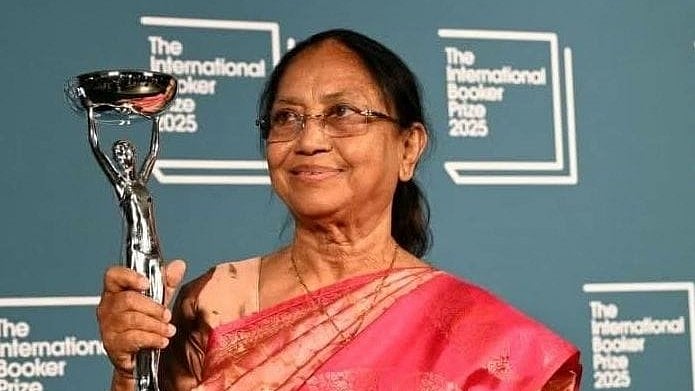
International Booker Prize winner Banu Mushtaq.
Credit: X/@siddaramaiah
Writer, activist, and lawyer Banu Mushtaq's short story collection Hridaya Deepa (Heart Lamp) on Tuesday claimed the coveted International Booker Prize in London, becoming the first Kannada work of literature to be bestowed the honour.
The second Indian author to receive the annual award after Geetanjali Shree in 2022 (for Tomb of Sand), Mushtaq's achievement sparked congratulations from eminent personalities and leaders from across India, while celebrations broke out in Karnataka.
Translated by Deepa Bhasthi, Heart Lamp tells 12 tales of women and feminism in patriarchal communities across India, with her work being described as something unique by international critics and media alike. However, prior to its win, it had received a muted international reception.
Max Porter, the chair of judges who announced the award, described Mushtaq's work as "something genuinely new for English readers: a radical translation" and praised it for being a "really special book in terms of its politics".
Writing about Mushtaq's work prior to its win, The Guardian had described the collection of short stories as having "concerns [that] are universal as well as culture-specific".
"This wonderful collection would be a worthy winner, though history is against it: stories have never taken the prize before," the UK-based publication wrote, perhaps foreshadowing the record-breaking win.
The BBC, meanwhile, showered praise on the collection and its author, writing, "Mushtaq's body of work is well-known among book lovers, but the Booker International win has shone a bigger spotlight on her life and literary oeuvre, which mirrors many of the challenges the women in her stories face, brought on by religious conservatism and a deeply patriarchal society."
"It is this self-awareness that has, perhaps, helped Mushtaq craft some of the most nuanced characters and plotlines," the UK broadcaster added in a lengthy article on the 77-year-old writer-cum-activist's life.
The Financial Times too had tall words of praise for Mushtaq: placing her work in the framework of Bandaya Sahitya, a literary movement of the 1970s and 1980s that arose against the dominance of males and upper-castes in Kannada publications. FT highlighted the "compassion and dark humour" that has been a characteristic of Mushtaq's writing.
"These deceptively simple tales decry the subjugation of women while celebrating their resilience. Bhasthi’s nuanced translation retains several Kannada, Urdu and Arabic words, eloquently conveying the language’s enduring tradition of oral storytelling," FT wrote in its review.
The Washington Post had similar praise to heap on Mushtaq's work. Noting Heart Lamp's achievement of becoming the first short story collection to win the International Booker, the Post wrote, "The collection has been lauded for its empathy and wry sense of humor."
However, the fact that Heart Lamp received very little attention prior to winning the prize was not lost. The New York Times, in particular, pointed out the lack of critical attention received by Mushtaq's work prior to its win.
"Heart Lamp beat five other shortlisted titles...," wrote NYT, adding, "In contrast to those novels, which many reviewers in Britain and the United States had praised, Heart Lamp had received little media attention before Tuesday’s announcement. Only one major daily British newspaper had given the collection a dedicated review."
Among those who did take note of the 77-year-old author's work was Publishers Weekly, which wrote a glowing review of Heart Lamp, praising Mushtaq for her "wryly humorous" writing and "gut-wrenching social critiques".
"The stories are united by a keen eye for the interplay between their characters’ social circumstances and inner lives, as religious authority and economic class exert their influence. It’s an excellent introduction to an author of rare talent," wrote Publishers Weekly.
Another notable international literary publication, Words Without Borders, also found immense value in Mushtaq's work, writing, "At the heart of Mushtaq’s narratives lie sustained struggles against patriarchy, distilled through the experiences of class, caste, and religion... Yet the women are not frozen as eternal victims, nor do all the stories revolve around female oppression."
"Although most of the stories are written in the third person, Mushtaq portrays her characters’ inner lives in a dramatic, emotive way ... that brings alive their thoughts, reactions, spirals, dreams, and fantasies," wrote the publication, adding, "Mushtaq and Bhasthi evoke and illuminate the inner worlds of women" in Heart Lamp.
The £50,000 award for winning the International Booker Prize will be shared by Mushtaq and Bhasthi, with the latter becoming the first Indian translator to win the coveted award.
